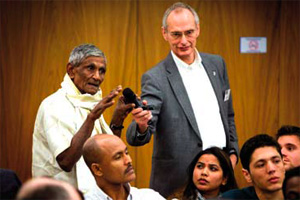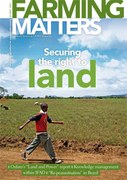Twenty years ago, the United Nations Conference on Environment and Development (UNCED) was held in Rio de Janeiro, Brazil. Many of the recommendations made in 1992 are still valid today. In June 2012 government delegations and numerous others will go to Rio again, to take stock of what has been achieved over the past twenty years and to address new challenges. All over the world preparations are already in full swing for the 2012 conference, “Rio+20”.
Rio+20 will focus on an economy model that promotes sustainable development and aims at eradicating poverty (a “green economy”), and on the institutional framework required to meet these goals.

Participants at the conference will include high level government representatives of UN member states, together with non-government stakeholders who participate in formally constituted “Major Groups”, representing farmers, civil society organisations, women and indigenous peoples, etc.
Greenwashing or a historical opportunity?
There are those who fear that Rio+20 is going to be a repeat of the 1992 conference and become another event where the necessities of eradicating poverty and saving the environment are discussed, without leading to any concrete results. They wonder if Rio+20 will lead to “green” measures that are built upon the existing system, which has caused much of the problems we are trying to solve.
The Women’s Major Group has emphasised that a “green economy” need not necessarily contribute to poverty eradication and sustainable development. There is a risk that the term “green economy” will be used for “greenwashing” existing unsustainable economic practices. Instead of this, Rio+20 needs to focus on questioning and fundamentally transforming the current economic paradigm.
From a more optimistic perspective, others argue that Rio+20 offers a historic opportunity to transform abstract commitments into concrete actions. Rio+20 can be a platform for fundamental transformation. There are real opportunities to upscale sustainable practices and to support viable local food systems.
No green economy without sustainable family farming
“The global mode of agriculture has dismally failed us”
Shuhao Tan, Renmin University of China
Agriculture is both part of the problem and part of the solution. How do we move from the present un-sustainable global food and agriculture system towards a much more diverse system that is fair and respects small-scale family farmers and environments across the globe?
Cosmetic changes are not enough. The Major Groups of farmers, civil society organisations and women are making strong cases for sustainable family farming, regionalised food systems, and for upscaling time-tested agro-ecological approaches.
Agriculture can nourish everybody with healthy, diverse and culturally appropriate food, provided the right political choices are made. The outcomes of Rio+20 need to support rights and access to resources for women and indigenous people. Land grabs need to stop, and food production should not be compromised for biofuel production. Public funding for agricultural development should be restored, including support for (participatory) knowledge generation and dissemination.
Building a roadmap
“There is an urgent need to bring a balanced perspective on small farmers to the Rio+20 debate. The disbelief of policymakers must be challenged head on”
Olivier de Schutter, Special UN Rapporteur for the Right to Food
We need a roadmap informed and inspired by the concrete experiences of farmers. Both successes and failures (which tell us the obstacles to upscaling sustainable practices) need to be widely shared and systematised. Rio+20 should give a boost to efforts that document crucial practical experience.
Let us use Farming Matters to share convincing experiences and reach out to policymakers and policy advocates, providing them with the ammunition they need.
We ask you, our readers and authors, farmers and scientists; those with a deep and experiential understanding of sustainable farming, to make your voices and your experiences heard in Farming Matters. Family farming does matter in a truly Green Economy.
Farming Matters forms part of a global network of magazines: www.agriculturesnetwork.org Together we reach more than half a million agricultural practitioners in 194 countries. This is a strong platform. You can influence global thinking on agriculture. Share your views, dreams and practical experiences! The more inspiring contributions we get, the stronger the message that Farming Matters will convey in Rio will be.
Text: Laura Eggens and Edith van Walsum

